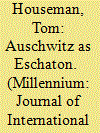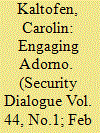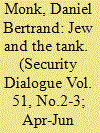|
|
|
Sort Order |
|
|
|
Items / Page
|
|
|
|
|
|
|
| Srl | Item |
| 1 |
ID:
124625


|
|
|
|
|
| Publication |
2013.
|
| Summary/Abstract |
The recent engagement with 'post-secular' thought has been especially pronounced within the critical tradition, in which messianic eschatology has been variously rehabilitated or reaffirmed. Amongst others, the thought of Theodor W. Adorno has recently been enlisted in this endeavour, culminating in a synthesis of critical theory and Jewish Gnosticism. This article argues that such a reading not only misrepresents Adorno's thought, but also misses its critical contribution. In contrast to the project of revivifying the messianic in order to save critical theory from aimless nihilism, Adorno's eschatology, inherited through a critical dialogue with Hegel, Marx and Benjamin, is a negative imprint, devoid of the theism, teleology and promises of salvation that characterise and secure other appropriations of the eschatological tradition. To recognise the originality and potency of Adorno's critical reworking of eschatology, I argue, we must understand the theological role played by Auschwitz throughout his writings. Adorno constructs a constellation in which Auschwitz is the eschaton, the horrific fulfilment of the promise of history. In doing so, he reconfigures the ethical impulse of the critical tradition: critical theory derives its purpose and urgency not from the promise of a better world, but from the horror of the present one.
|
|
|
|
|
|
|
|
|
|
|
|
|
|
|
|
| 2 |
ID:
120086


|
|
|
|
|
| Publication |
2013.
|
| Summary/Abstract |
Even though its focus on emancipation purposefully intends to build upon the intellectual legacy of the Frankfurt School, critical security studies has thus far only interpreted the Frankfurt tradition in a circumscribed manner. That is to say, it selectively drew on some concepts from critical theory that are most associated with Jürgen Habermas and Axel Honneth. However, as a result of this emphasis, Booth and Wyn Jones - the original proponents of critical security studies - give too little attention to thinkers such as Theodor W. Adorno. This article demonstrates that a re-engagement with Adorno's work not only provides a more complete appraisal of the Frankfurt School's thought, but also might reinvigorate critical security studies as a 'critical' approach to security. It proposes that such a result can be achieved by employing Adorno's ethics of resistance and through the development of the philosophical construct of a constellation of security.
|
|
|
|
|
|
|
|
|
|
|
|
|
|
|
|
| 3 |
ID:
175125


|
|
|
|
|
| Summary/Abstract |
Histories of the Arab–Israeli War of 1967 have advanced a curious commonplace. As they have sought to account for the decisive factors in what they treat as a decisive war, soldiers and interpreters of their arguments have tacitly resorted to what Adolf Loos once referred to as a ‘principle of cladding’, or bekleidungsprinzip, in order to explain the successes of Israel’s armored corps. The bekleidungsprinzip is not a military principle but a dictum of fashion, according to which the renunciation of individual affect in dress is presumed to coincide with the emergence of the qualitative advantages of the modern. With little or no explanation to substantiate the relation between dress and success in armored warfare, histories of this war have instead explained that the causes of a decisive victory may have to be found in the relation between uniforms and technical uniformity. This presupposition possesses an intellectual history, in the course of which war intellectuals repeatedly sought to reconcile what they themselves posed as a contradiction between agency and structure by identifying a proper relation between habit and habitus. Elaborated in a series of doctrinal debates concerning the proper relation of the Jew to the tank in the Israel Defense Forces – and in subsequent interpretations of those disputes – the bekleidung argument is more than a mere curiosity of military history. It points, instead, to a theodicy of conflict according to which a reification of this history’s false premises presents itself to view in repeated images of their transcendence.
|
|
|
|
|
|
|
|
|
|
|
|
|
|
|
|
| 4 |
ID:
088370


|
|
|
|
|
| Publication |
2009.
|
| Summary/Abstract |
Both Ralph Waldo Emerson's and W. E. B. Du Bois' firstborn sons tragically died at very young ages. Drawing from the essays where they write about their grief, I explore Du Bois' "subversion" and "revision" of Emerson's thought by contrasting their visual metaphors: Emerson's "focal distancing" and Du Bois' practice of "second sight" and seeing through "the Veil." I show how the disruptive particular event of the deaths of their sons causes both to challenge the idealist elements of their respective gazes. I draw upon Theodor Adorno to explore the larger lessons of these reconsiderations. In recognizing the seductive dangers of the idealist gaze and the value of the disruptive particular, Adorno explicitly theorizes what Emerson and Du Bois also come to appreciate, in a less overt way, in their moments of loss.
|
|
|
|
|
|
|
|
|
|
|
|
|
|
|
|
|
|
|
|
|